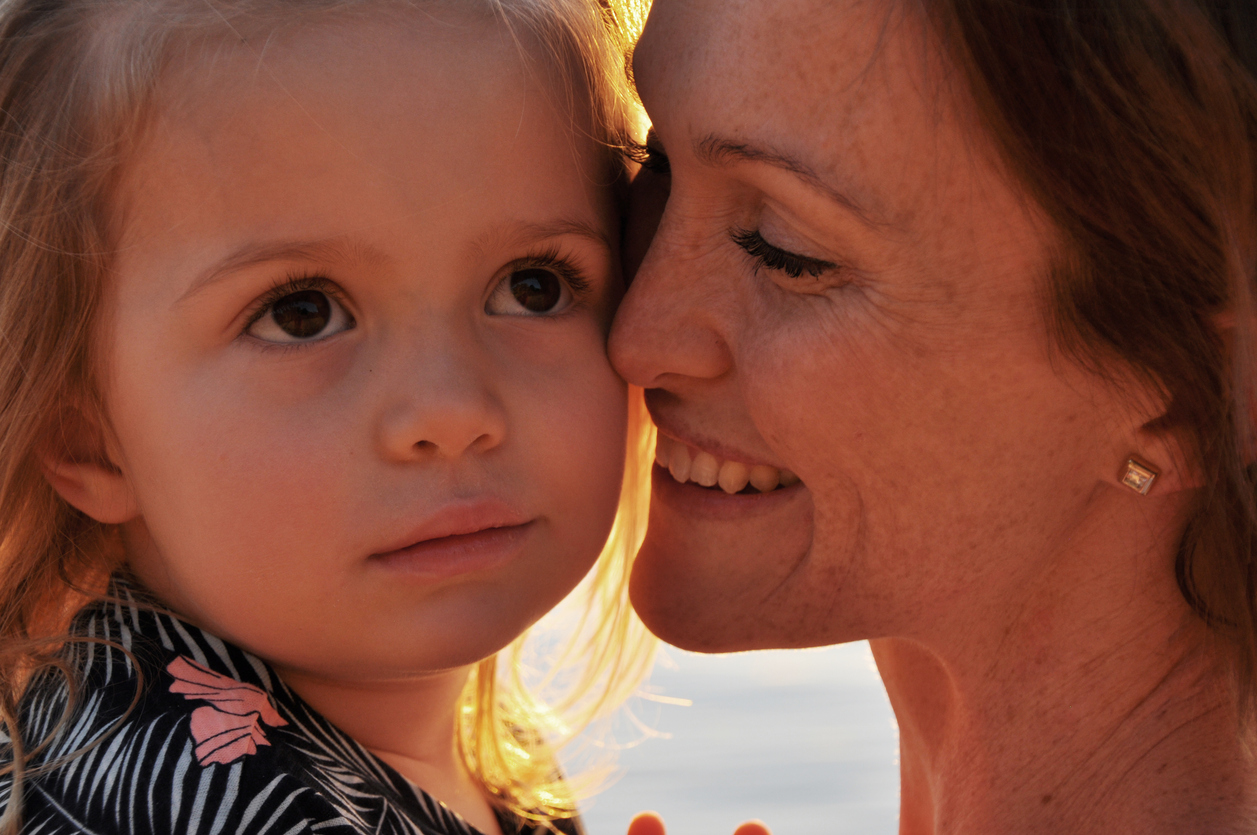7 Traits Babies Inherit From Their Mother

Babies inherit a lot more than just eye color and height from their parents.
As you await the arrival of your new baby, you’ll probably wonder not only what they will look like, but how they’ll act, talk, walk, and more. What makes some babies look more like Mom, while others are the spitting image of Dad?
It comes down to a combination of genes and lifestyle.
While most genes are passed on from both parents, there are some inherited traits that can be linked directly to the mother. Maternal inheritance is a fascinating thing, and further illustrates the powerful connection between mom and baby.
Thankfully, studying genetics has allowed us to pinpoint which of these traits come from which parent, so you can narrow down exactly who your little one got those dimples from.
Related: 6 Traits Babies Inherit From Their Father
Here are some physical and personality traits you probably didn’t know you inherit from mom’s side.
1. Sleeping Style
If you're frustrated with a baby who just won't go to sleep, it could be that insomnia runs in the family! According to new research from the “Journal of Sleep Medicine,” mothers often have more of an influence on the sleep habits of their children as they typically spend more time with youngsters than fathers do.
According to the research, “Results reveal children of mothers with insomnia fall asleep later, get less shut-eye and spend less time in deep sleep. There is no association between fathers' sleep problems and those of their children.”
From tossing and turning all night, insomnia, or needing more naps than others, babies can pick up on these sleep habits from mom. Monkey see, monkey do!
2. Temperament
Will your little one not stop crying or screaming? You may have yourself to thank (or blame) for that! While their environment does play a part in this, new studies have indicated that genetic makeup could play a larger role in your baby’s temperament.
According to a German study published in the “Journal Behavioural Brain Research,” “Individuals who carry a specific type of allele, or alternative form of a gene, are far more likely to be angry than those without this allele.”
However, in the battle of nature vs. nurture, the environment your child grows up in also has a huge impact on their behavior and temper as they grow into adults.
So, mom and dad should try to demonstrate healthy communication strategies starting when your children are very young. It’s been proven that kids with parents who regularly screamed and fought in front of them are more likely to exhibit these behaviors.
3. Exercise Endurance

If dad ever starts bragging that his kids inherited their athleticism and sports prowess all from him, it might not be true! In fact, mom may be the one most responsible for those sporty genes.
In nearly all mammals, our mitochondrial genome (commonly called the powerhouse of the cell) is inherited exclusively from the mother. Meanwhile, the other type of DNA, nuclear DNA, is inherited from both parents. Therefore, “pro athlete genes” and things like stamina or physical endurance can be said to be inherited on the mother’s side.
A study published in 2005 in the Journal of Applied Physiology found that a mother's capacity for exercise alone can better predict a child's capacity, than when fathers are taken into account. Mitochondrial DNA also plays a role in how a person uses oxygen cells during exercise.
4. Signs of Aging

Want your baby to look young forever? Mom better wear sunscreen! Another genetic trait babies inherit from their mom (and their mom’s mitochondrial DNA) is physical signs of aging. Ever hear the expression, “you’ve got good genes?” Well, there may be some truth in that.
Wrinkles, laugh lines, and crow’s feet are all common physical signs of again. Of course, a person’s skin and appearance are influenced by a variety of environmental factors such as sun exposure, UV ray exposure, and free radicals.
However, studies have shown that if our mother’s skin cells and DNA have mutations or sun damage, these mitochondrial DNA mutations may be passed down. According to research led by Nils-Göran Larsson at the Max Planck Institute for Biology of Ageing in Cologne, “Aging is determined not only by the accumulation of DNA damage that occurs during lifetime but also by damage that we acquire from our mothers.”
So if you ever wonder why some people seem to say fresh and youthful for decades, they may have mom’s smart skincare routine to thank!
5. Mitochondrial disease
Mistakes, or mutations, in the mitochondrial DNA can also be passed on from mother to baby. When a person has mitochondrial disease, the mitochondria in the cells are not producing enough energy.
Depending on how many cells are affected and where they are in the body, it can cause a range of health issues, including deafness, blindness, diabetes, heart disease, and liver failure.
The controversial ‘three-parent’ technique can be used to avoid babies being born with fatal mitochondrial diseases. This involves using a donor egg with healthy mitochondria. The mother’s nucleus is then transplanted into the healthy donor egg and fertilized with the father’s sperm.
However, there are some questions on whether this technique actually works in the long term, with some studies showing “reversion" where the proportion of mitochondrial genes from the child’s mother increased over time.
6. Other inherited conditions
A pair of chromosomes called the sex chromosomes determine whether baby is a boy or a girl. During fertilization, a baby will inherit an X chromosome from Mom’s egg cell and either an X or Y chromosome from Dad’s sperm. XY results in a baby boy, so boys only have one copy of an X chromosome. Inheriting a faulty copy of a gene on the X chromosome causes recessive X-linked genetic conditions.
Examples include red-green color blindness and hemophilia, a condition that causes the blood to not clot properly.
These conditions are rare in women because they would need to inherit two copies of the recessive gene on an X chromosome, one from each parent, to have the condition.
7. Mood disorders
Although your mental health is influenced greatly by your circumstances, research has shown that it does run in families. That said, we can’t pin depression down to a single gene.
If someone has a parent or sibling with depression, that person probably has a 2 to 3 times greater risk of developing depression compared with the average person. A study (Yamagata et al, 2016) from 2016 analyzed 35 families and found that depression is more likely to be passed from mother to daughter compared to from father to daughter, or father to son.
However, we can’t say for sure that this was due to inheriting the mother’s genes or because of other factors.
Another study (Halmoy et al, 2010) showed that children whose mothers had mutations in their genes linked to reduced production of serotonin were more likely to develop attention-deficit hyperactivity disorder (ADHD). Their explanation for this was that maternal serotonin deficiency during pregnancy might affect the baby’s development.
Can Choices Made During Pregnancy Influence A Baby’s Traits?
It is widely accepted that the choices a pregnant woman makes can affect the health of her baby. Evidence suggests that smoking, high alcohol and caffeine intake, diet, obesity, and malnutrition can potentially cause changes during the baby’s development that will have lasting consequences into adulthood.
Drinking alcohol during pregnancy can interfere with the normal growth of the fetus and cause birth defects, whereas smoking increases the risk of preterm birth, birth defects, and childhood asthma.
A healthy diet during pregnancy is also important. Research carried out by scientist Dr. Nicole Avena and her colleagues has shown (although mostly in rats) that a maternal diet high in fat or sugar leads to the child growing up obese and also “can have a long-lasting impact on the offspring’s risk of developing mental-health disorders, impaired social behaviors, lower cognitive abilities and increased response to stress”.
Less well-known is the evidence that suggests health before conception is also important. A series of three papers published in the medical journal “The Lancet” in 2018 called for a social movement to make women (and men) more aware of the importance of good health during this stage in their life.
Why Does One Sibling Look Like Mom But The Other Doesn’t?
Mom has brown eyes and curly hair and so has one daughter, but her other daughter looks completely different with her blue eyes and straight hair – can genetics explain what is going on?
Our physical traits, like hair color, come from the genes we inherit from our parents. Genes are found on long strings of DNA called chromosomes and we inherit 23 pairs of chromosomes - one set from Mom and one from Dad.
Each sperm and egg cell will have a different random mixture of chromosomes, plus some genes are able to cross over to other chromosomes. This means that each time fertilization occurs, the resulting embryo will have a different mix of genes with different genetic information.
Plus, genes have different variants called alleles. Some are recessive and some are dominant – the effects of recessive genes are masked by dominant ones.
This explains why siblings will share some physical traits with each other and Mom and Dad but won’t look identical, even though they might look very similar.
Genetics Isn’t The Only Factor
Of course, while all this research into genetics and inheritance is interesting, parents mainly have no control over the genes they pass to their children, so blame (or credit) should not come into play!
Most often, babies are a perfectly intricate mix of both parents, but there are still more than a few things they could pick up from just mom or dad. Does your little one have any traits from you?

